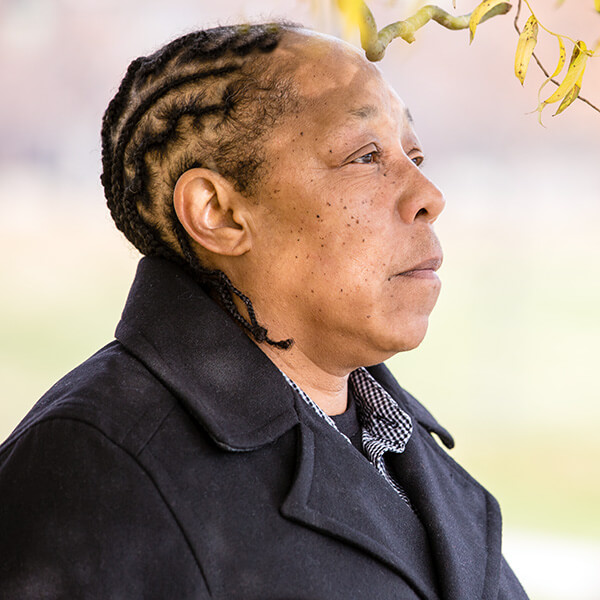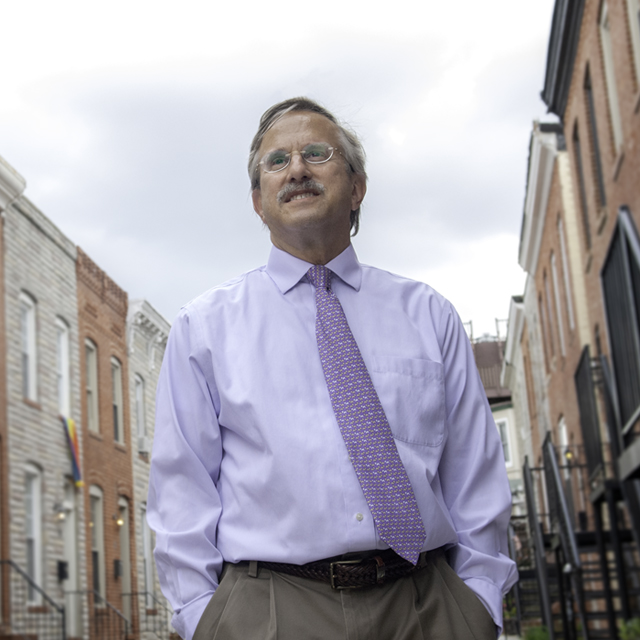Johns Hopkins Peer Recovery Specialist Helps Opioid Overdose Survivors

Image above: Peer recovery specialist Patrice Brown supports patients in the community as part of the Maryland Overdose Survivors Outreach Program.
After Calvin Cummings overdosed on heroin in May 2019, he was admitted to The Johns Hopkins Hospital through the emergency department. There he was referred to Patrice Brown, who supports patients in the community as an integral part of the Maryland Overdose Survivors Outreach Program. Brown assists recent overdose survivors in finding supportive treatment services based on their needs. She continues to be a consistent point of contact for them throughout their treatment process.
“I’m very thankful Patrice came to my bedside that day,” says Cummings. “She gave me strength.”
Drug overdose is the leading cause of death for Americans under 50, according to the National Safety Council. Drug overdose deaths now exceed those attributable to firearms, car accidents, homicides or HIV/AIDS. According to a JAMA Psychiatry study, survivors of opioid overdose are at an increased risk of dying in the year after an overdose.
Brown is part of Johns Hopkins’ inpatient substance abuse team, which is overseen by the Department of Care Coordination and Clinical Resource Management. She, who is herself celebrating 20 years in recovery from cocaine addiction, spends her days checking in at the emergency department to meet with new patients and traveling to treatment centers and homes to see them after they are discharged. For the first 90 days, she visits them at least three times a week. She also finds time to confer with the health department to make sure her rehabilitation resources list is as robust as possible.
When Cummings was released from the ED, he elected initially to “find his way.” He realized he needed help. He called Brown, who picked him up on an East Baltimore corner — he had been living in a truck —and drove him to an intensive outpatient treatment program that provided housing as well as daily group discussions, one-on-one counseling and medication-assisted treatment support.
“Patrice made sure there was a bed for me when I got there. She made sure that when I got there, late or not, they wouldn’t turn me away,” Cummings says. “Patrice checks in and makes sure I have a way to get to (Narcotics Anonymous) meetings. I listen to her story of how she’s overcome challenges, and she inspires me to do better. Patrice assures me that all we have to worry about is today, and she keeps me positive.”
Cummings is now successfully in recovery and is living in supportive housing.

Providing Vital Support during Early Recovery
Hired in March 2019, Brown has worked with nearly 100 patients so far. She says she has as many as 17 active cases at one time, mostly receiving treatment outside the hospital. As heroin cravings may recur periodically for several months following physical detox, at least three months of follow-up care with daily therapy is recommended to prepare the patient for life without drugs. Brown says getting support during this vulnerable period is a crucial element in most recovery success stories.
“From my own journey, I know recovery is possible,” she says. “It has less to do with the substance and more to do with other issues that have caused the person to retreat and avoid real life.”
Brown says it’s important to really listen to her patients. She always asks them to tell her about their lives so that she can better understand their needs.
“They have their own thoughts and ideas about what their help should look like,” Brown says. “Maybe they don’t like the structure of a particular recovery program, so I know I need to find them something that more aligns with their needs. They become more empowered and start to believe that they do have value.”
Lafaun Davis, who met Brown in the emergency department after a heroin overdose in April 2019, says her assistance is helping him to stay clean. After he was released from the ED, Brown helped him enroll in a 10-day detox program. Then, when he relapsed in November 2019, she facilitated Davis’ admission to a 28-day inpatient program in Hagerstown.
“She was professional and empathetic to my situation,” Davis says. “You could tell she wanted to help in any way that she could.”
Davis now calls Brown at least three times a week to check in. He says she picks up the phone every time.
“She’s someone who I know cares and wants the best for me,” he says. “She’s taught me that I am somebody, I have worth and life is worth living.”
Davis has recently accepted a position with The Johns Hopkins Hospital’s patient transport division.
For more information about substance abuse resources, visit hopkinsmedicine.org/substance_abuse_center/treatment/quick_phone_list.html.
For more information about the Overdose Survivors Outreach Program, visit bha.health.maryland.gov/OVERDOSE_PREVENTION/Pages/OSOP.aspx.


 Pathways Drug Rehabilitation Luxury Addiction Treatment & Detox Center
Pathways Drug Rehabilitation Luxury Addiction Treatment & Detox Center


